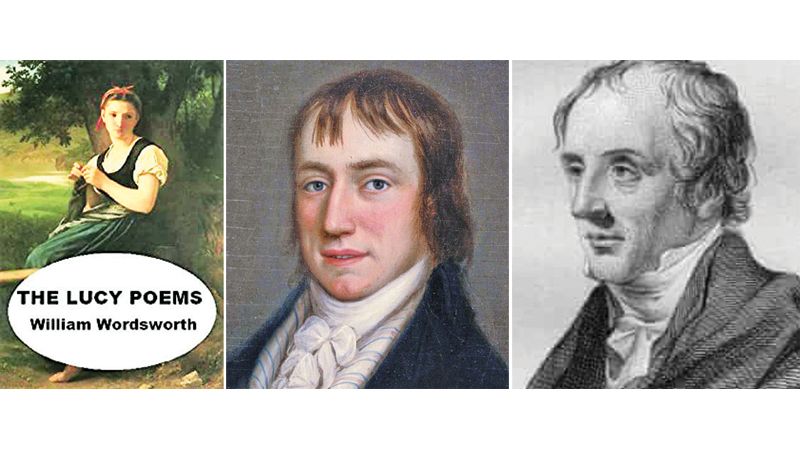Lucy Gray is a ballad published by English poet Wordsworth (1770-1850) about a young girl. It consists of 16 flowing stanzas (verses of four lines) rolling around the unfortunate fate of Lucy Gray, the protagonist of the poem who walked into a snowstorm and never returned.
Oft I had heard of Lucy Gray
And, when I crossed the Wild,
I chanced to see at break of day
The solitary child.
English Romantic age poetry (1790-1830) was mainly characterised by seven poets namely Blake, Wordsworth, Coleridge, Keats, Lord Byron, Shelly and Scotsman Robert Burns.
Ballad is a poem often punctuated by 4 line verses of ABAB rhyme with stressed/unstressed syllables and narrates a story, unlike a lyric which describes emotions.
However, Lucy Gray touches the emotions of the reader in a rhythmic ballad form.
No mate, no comrade Lucy knew;
She dwelt on a wide moor,
-The sweetest Thing that ever grew
Beside a human door!
The poem was inspired by a real incident that happened in Halifax, Yorkshire, told to him by his sister Dorothy while he was living in snowy Goslar in Germany. It was written in 1799 and first published in 1800 in the second volume of “Lyrical Ballads” jointly done by Wordsworth and Coleridge.
You yet may spy the Fawn at play,
The Hare upon the Green;
But the sweet face of Lucy Gray
Will never more be seen.
In the poem Lucy, the little girl is connected to nature, nature from which she appears and to the wilderness to which she disappears. As per H W Garrod ‘Lucy’ of Lucy poems ( series of 5 poems) and ‘Ruth’ in ‘Ruth’ are “ an order of beings that have lapsed out of nature- the nature of woods and hills- into human connections hardly strong enough to hold them. Perpetually they threaten to fall back into a kind of spirits.” He merely suggests nature will always overpower humanity in whatever mood.
“ To-night will be a stormy night,
You to the Town must go,
And take the lantern, Child, to light
Your Mother through the snow”
“ That, Father! Will I gladly do;
‘ This scarcely afternoon-
The Minster-clock had just struck two,
And yonder is the moon.”
She is asked to go to the town by his father around two o’clock in the afternoon to bring back her mother before the snowstorm. In the imagination of the poet or according to what he heard the poet suggests a request has been made to take the lantern for light indicating the outside was dark and the storm was already out there or waiting to break free.
Lucy the obedient child gladly accepts the offer to go out, maybe she liked nature even under storm or she did not realise the danger she was going to face.
“Not blither is the mountain roe;
With many a wanton stroke
Her feet disperse the powdery snow,
That rises up like smoke.
This suggests the child was happier than a deer and its with her eagerness for nature that she uttered “gladly” in the previous stanza.
The storm came on before its time,
She wander’d up and down,
And many a hill did Lucy climb
But never reach’d the Town.
The storm is early that day and she goes a long way through the snowstorm losing her way climbing mountains hoping to fetch her mother from town on that fateful day. However, she never reaches town.
The wrecked parents all that night
Went shouting far and wide;
But there was neither sound nor sight
To serve them for a guide.
At day-break on a hill they stood
That overlooked the Moor;
And thence they saw the Bridge of Wood
A furlong from their door.
They wept, and turning homeward cried
“In Heaven we all shall meet!”
When in the snow the Mother spied
the print of Lucy’s feet
In the poet’s mind, the parents understand the inevitable when they see the bridge and the little footprints heading towards the stream. Next three stanzas follow the girl’s footprints which disappear in the middle of the plank of the bridge.
They followed from the snowy bank
The footmarks, one by one,
Into the middle of the plank,
And further there were none.
Last two verses spontaneously resurrect Lucy from death to an ‘Angel spirit’ in the lush green of Halifax.
Yet some maintain that to this day
She is a living Child,
That you may see sweet Lucy Gray
Upon the lonesome Wild.
Over rough and smooth she trips along,
And never looks behind;
And sings a solitary song
That whistles in the wind.
These two stanzas immortalize Lucy into blissful nature’s sublime glamour with the artistry of Michael Angelo.
The striking feature of this poem has always been the class of Wordsworth. Only the very best poets can touch the mass readership’s complex emotions through nature and humanity albeit in simple language. Wordsworth is at the forefront in English Romantic era in doing so and was symbolic and a touching magician in his craftsmanship.
Lucy Gray was different to ‘Lucy’ in 5 ‘Lucy poems’ by Wordsworth which was mainly found in the same second “Lyrical Ballads” of 1800 for its age and relationship to the narrator is known. ‘Lucy’ is a character of unknown age and relationship to the narrator and mainly found in Wordsworth’s longing of his friend Coleridge in Germany and his stress of being in the sole company of his sister Dorothy. While ‘Lucy Gray’ was a ballad all others were poems of self-defence from an emotional breakdown. They were isolated in nature, never followed a sequel nor were grouped by critics until Wordsworth died in 1850.



Add new comment